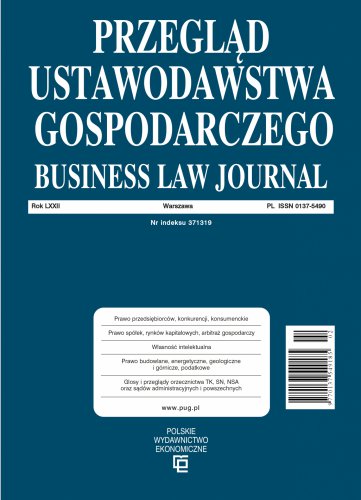The role of legislative materials in law interpretation process — comment on Supreme Court resolution from 19th October 2017 (sign. CZP 45/17)
The following paper is inspired by an undergoing debate at the Supreme Court of the Republic of Poland pertaining to a controversial issue presented in the documents of legislative process, namely that of the interpreter's and the legislator's interdependency. Employing the legal and factual framework of a question addressed to the Supreme Court of the Republic of Poland, concerning an interpretation of one of the infrequent agricultural and rural laws, the author aims to expand on the question's main concept, as well as the motifs present in the voted legislation. For this reason, the main purpose of this paper is to determine how the legislative materials can impact on the legal interpretation process. Hence, the author's commentary on The Supreme Court's argument which is directly connected to the interpretation of the debated regulations, pinpoints the functional and systematic rationale of the Supreme Courts's stance. Consequently, by utilizing the theoretical and legal constitutional arguments, the author comes to a conclusion that even though the legislative process' documents may be useful in the process of law interpretation, they ought to be considered as subsidiary models of interpretation only. For this reason, referring to them ought not to transform the unequivocal linguistic, functional and systematic interpretation.
References
Bibliografia/References
Buera, F. J., Shin, Y. (2010). Financial Frictions and the Persistence of History: A Quantitative Exploration. Journal of Political Economy, 121(2), 221–272. https://doi.org/10.3386/w16400
Jędrzejczak, G., Sterniczuk, H. (2019). Innowacyjność — polski problem rozwojowy. Doganianie Zachodu w warunkach nieciągłości. Warszawa: Wydawnictwo Naukowe Wydziału Zarzadzania UW.
Lagarde, Ch. (2019). President of the European Central Bank (ECB) addresses the 29th Frankfurt European Banking Congress in Frankfurt, Germany, Nov. 22. https://www.ecb.europa.eu' https://www.ecb.europa.eu (2.12.2019).
Lin, J. Y. (2009). Economic Development and Transition: Thought, Strategy and Viability. Cambridge: Cambridge University Press.
Lin, J. Y., Nowak, A. Z. (red.). (2018). Nowa polityka strukturalna w warunkach otwartej gospodarki rynkowej. Warszawa: Wydawnictwo Naukowe
Wydziału Zarządzania UW. https://doi.org/10.7172/978-83-65402-93-6.2018.wwz.11
Mazzucato, M. (2016). Przedsiębiorcze państwo. Obalić mit o relacji sektora publicznego i prywatnego. Poznań: Wydawnictwo Ekonomiczne Heterodox.
Mączyńska, E. (2019). PKB powinien być środkiem, a nie celem. Obserwator Finansowy, https://www.obserwatorfinansowy.pl/forma/rotator/pkb--powinien-byc-srodkiem-a-nie-celem/ (18.11.2019).
Morawiecki, M. (2016). Przedmowa. W: M. Mazzucato. Przedsiębiorcze Państwo. Obalić mit o relacji sektora publicznego i prywatnego. Poznań: Wydawnictwo Ekonomiczne Heterodox.
Nowak, A. Z., Zalega, T. (red.). (2019). Makroekonomia. Warszawa: PWE.
Putnam, R. D., Leonardi, R., Nanetti, R. Y. (1995). Demokracja w działaniu: tradycje obywatelskie we współczesnych Włoszech. Kraków: Społeczny Instytut Wydawniczy Znak. Warszawa: Fundacja im. Stefana Batorego.

